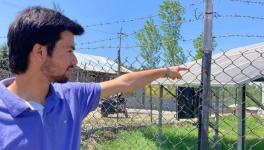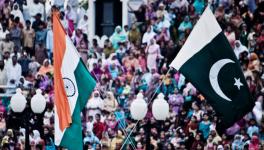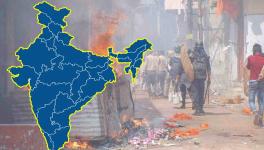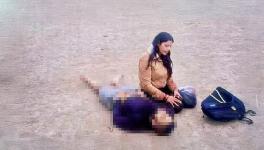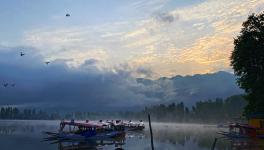Kashmir Quarantine Zones in Bad Shape, Precautionary Measures Inadequate
Srinagar: Authorities in Kashmir stepped up restrictions as a measure to prevent the spread of COVID-19 on Friday as the valley confirmed its first positive case two days ago, bringing daily life to an abrupt halt across the region.
Regional health experts, however, say the authorities need to prioritise precautionary measures to fight the novel coronavirus outbreak which is yet to enter an uncontrollable phase in Kashmir.
Medical experts claim the healthcare system in the region is absolutely ill-equipped to fight an outbreak like coronavirus, which has almost crumbled strong healthcare systems in majority of countries affected by the pandemic.
According to World Health Organisation (WHO), the novel coronavirus or COVID-19, based on data by national authorities, has infected as many as 2,09,839 people and claimed 8,778 lives so far, with nearly half of these deaths in the European Region alone.
"The pandemic has crumbled top notch healthcare systems in developed countries and our healthcare system lacks even basic response infrastructure to deal with the outbreak, which is why the only solution is to go under self- quarantine for some time," a resident doctor in Srinagar said.
Dr Masood Rashid, consultant anesthesiologist, told NewsClick that the situation in Kashmir could turn apocalyptic if basic guidelines to quarantine arrivals from outside were not followed properly.
"There is no original case in Kashmir, and we have imported the disease after a case with travel history was reported. There is no adequate infrastructure. So, the only way to contain the outbreak is by regulating the influx of people from outside," Dr Masood said.
Experts have identified three stages for the pandemic which begins after the disease gets imported - the exponential phase followed by a stationary phase and the decline phase.
While the disease has already been imported to Kashmir, medical experts say, the disease is yet to enter into the exponential phase in which it wreaks havoc, as it has done in China, Italy and Iran.
Another doctor working at SKIMS, a premier healthcare institute by local standards, agrees that until individuals travelling to Kashmir from outside are stopped or regulated, internal restrictions would not make much of a difference.
"About 4,000 people are entering the valley on a daily basis. The administration cannot provide quarantine facilities to all, yet all those are potential carriers of the disease. Unless this external influx is regulated, the healthcare system in Kashmir cannot respond to the crisis," the SKIMS doctors said.
The doctors said for once the entire region has to be quarantined to respond and contain the initial threat after the first positive case in Srinagar. "There is an incubation period, it is also likely that a person who doesn't show most symptoms at the airport can develop all the symptoms later on after the incubation period," he adds.
Travelers, including pilgrims and students coming back to Kashmir, have been since yesterday taken to quarantine zones in several locations in the city.
At the already designated quarantine zones, the situation appears grim too.
An MBBS student quarantined at a Srinagar hotel said the authorities mixed up individuals coming back from different countries and complained of lack of basic facilities at these designated places.
"Most of the toilets don’t even have water supply. We requested the authorities not to mix us up, but they did not listen and responded by saying that the state doesn’t have enough money to test everyone," the student said.
Tahleel Mushtaq's sister is one of the MBBS students from Bangladesh who returned to Srinagar on Thursday. "I spoke to my sister, who also complained about basic hygiene. She has been put up with three others in a single room and last night had dinner with nine others. Even if she is not affected, she might, given the mix-up," Tahleel told NewsClick.
When asked, Srinagar's Deputy Commissioner Shahid Choudhary: "We are setting up facilities in place and we are trying our best but, they can’t be comfortable like homes."
In another facility, however, where two people share a single room another student claimed they were also mixed up and instead of bringing medical teams for screening, the students got to meet their relatives at the designated quarantine zone.
"We were expecting doctors who never came, but parents entered the facility and everyone met them. Even I met my aunt. That’s not how isolation works," a quarantined student said in an audio note.
Meanwhile, the condition of the first positive case in Srinagar, who was affected after returning from a religious pilgrimage from Saudi Arabia, is reportedly stable.
A senior police officer, Imtiaz Ismail Parray, who was also quarantined after his close relative tested positive wrote on Twitter: "Want to update the well wishers again: 2 family members including father in law tested negative. Mother in law recovering very well by the grace of god. Thanku all for prayers n support. But we are following the due protocol...thank Admin...(sic)"
Several doctors in the city, however, fear that the situation may descend into deep chaos if necessary precaution is not taken, especially with regard to necessary quarantine and the influx of people from outside. Looking at what happened to most nations, Kashmir's healthcare system, they say, will crumble within a day.
Get the latest reports & analysis with people's perspective on Protests, movements & deep analytical videos, discussions of the current affairs in your Telegram app. Subscribe to NewsClick's Telegram channel & get Real-Time updates on stories, as they get published on our website.











